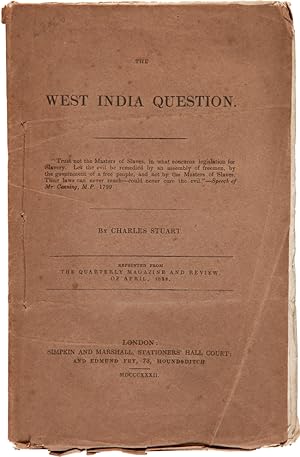About this Item
44pp. Original printed brown wrappers, stitched. Wrappers a bit creased and worn. Occasional minor foxing and creasing throughout. Very good plus. Untrimmed. The first separate printing of this passionate and oft-republished argument against slavery in the British colonies. The author, Charles Stuart, was actually born in the British West Indies in 1783, though he moved to Belfast shortly afterwards. After a brief stint in the army, Stuart emigrated to Canada where he established a settlement for fugitive slaves who had fled across America's northern border and set his pen to the abolitionist cause. Originally printed in The Quarterly Review just a few months prior, the present pamphlet represents one of the author's earliest and most influential additions to anti-slavery literature. Stuart found an equally receptive audience in the United States, and this work was swiftly reprinted in New Haven in 1833 and twice in Newburyport, in 1835 and 1838. The title sums up the author's main points aptly - to save Great Britain herself from "the crimes gnawing at her heart," nothing short of immediate and full emancipation will do. As one of his main arguments, Stuart points out how the northern, "free" states in America have grown considerably richer and more populous than their slaveholding counterparts, despite the "unsurpassed fertility" of the South. He concludes the pamphlet with a detailed plan for effecting emancipation and compensating slaveholders for their loss, while fully admitting that, in regards to occasional cases where recompense would be impossible, "Such cases might occur, but they would certainly be rare.It is unquestionably better in every sense, that a few criminal individuals should suffer a pecuniary loss, than that hundreds of thousands of innocent people, should continue bereaved of all that is most unalienably the real property of man, and of all that is fundamentally dearest to every right feeling of the human heart." Beyond abolition, perhaps his most radical statement is slipped surreptitiously into his outlined plan, which includes the assertion that "All difference in Law on account of colour, [is] to be abolished." This first London printing is considerably less common, both institutionally and in the market, than the later American printings. A very nice copy of this influential abolitionist pamphlet, in original condition. SABIN 93144. RAGATZ, p.557. Seller Inventory # WRCAM62353
Contact seller
Report this item
![]()

